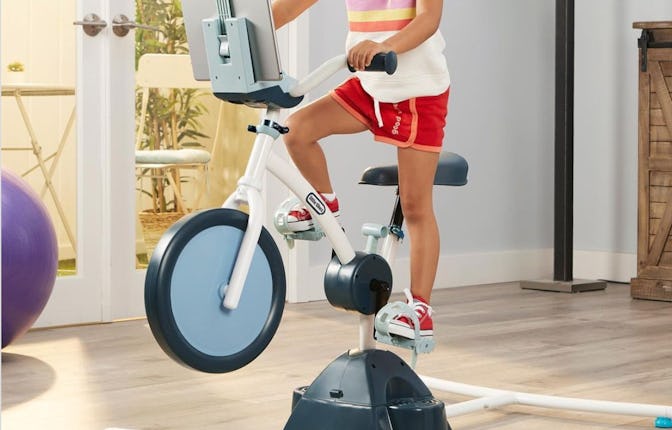Little Tikes’s kiddie Peloton is the dystopian toy no one asked for
You, too, kiddos, can pedal in place in your living room while glued to a screen.

At $1,495 — not including the $39 monthly fee to watch video classes — Peloton’s glorified stationary bike has been widely dragged as a plaything of the wealthy. But now it faces stiff competition for most obnoxious product ever, this time from Little Tikes. CNN reported that the toymaker decided to capitalize on surging pandemic sales of the bougie status symbols with something literally no one asked for: a kiddie Peloton.
Branded as “the Pelican,” the stationary bike for three- to seven-year olds even has a screen for watching videos, just like the adult version. CJ Rich of Florida bought a kids’ stationary bike for his now six-year-old son because he thought it would help them bond, per CNN. “I thought it would be awesome for him to have something to copy me," he said. You, too, kiddos, can spend your free time pedaling in place while glued to a screen, just like Dad.
Child development experts share my skepticism. They pointed out to CNN that riding a stationary bike doesn’t teach the same social and problem solving skills as riding an old-school bike. "A stationary bike doesn't prepare them for anything but moving their legs in a circular motion,” Lenore Skenazy, the president of Let Grow, a nonprofit that advocates for raising independent, resilient kids, told the outlet.
If I sound old and cranky, it’s because I kind of am. As an elder Millennial who worries that my generation was the last to grow up playing outside, I don’t think that just because we’ve transformed into screen-obsessed hermits means that our kids have to. The exhilaration of riding your bike around the neighborhood is one of the few pure childhood joys that’s remained untouched by tech.
Plus, the Peloton carries not only the antisocial tech of adulthood, but the body consciousness, too. While many of us use fitness equipment for the mental and physical health benefits, let’s be real: many of us also do so for the physique it promises. Indeed, Jason Boye, a pediatric psychologist in the Healthy Weight and Wellness Clinic at Nemours Children's Hospital in Delaware, told CNN that such products could make kids see physical activity as something they “have” to do. But they should be running — or riding — around because it’s fun, not because they feel the need to be slim thick or swole.
Mike Bloomfield, VP of product development at Little Tikes, said that he doesn’t think the Pelican will replace regular bikes, per CNN, nor should it. Regardless, this looks like yet another example of capitalism creating a problem that doesn’t even exist. We can already buy bikes for kids — ones that don’t expose them to our generation’s collective unease.